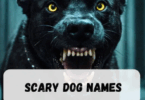In the vast lexicon of dog names, there exists a spectrum ranging from the whimsically adorable to the profoundly powerful. While “Daisy” and “Buddy” certainly have their charm, an increasing number of dog owners are seeking names that convey a sense of strength, authority, and even a touch of menace. This isn’t necessarily about fostering aggression in a pet, but rather about leveraging the psychological impact of a name to project an image of a formidable companion, a guardian, or simply a dog whose presence commands respect. The choice of an intimidating name can be a subtle yet effective deterrent to potential threats, a declaration of your dog’s inherent power, and a reflection of a personality that is anything but meek. This article delves into the fascinating world of intimidating dog names, exploring the nuances of their selection, their psychological underpinnings, and providing extensive lists that will help you find the perfect moniker for your commanding canine.

intimidating dog names
2. What is the Most Intimidating Dog? Defining Dominance Beyond the Breed
When we ponder “the most intimidating dog,” our minds often conjure images of large, powerful breeds like Rottweilers, Pit Bulls, Doberman Pinschers, or German Shepherds. These breeds, with their muscular builds, strong jaws, and protective instincts, inherently possess a physical intimidation factor. However, true intimidation transcends mere physical prowess. A small dog with an imposing name and an assertive demeanor can be far more “intimidating” in certain contexts than a gentle giant named “Cuddles.” Intimidation in a dog can be defined by a combination of factors:
- Physical Presence: Size, musculature, and a confident gait contribute significantly. A dog that moves with purpose and occupies space commands attention.
- Vocalizations: A deep, resonant bark can be profoundly intimidating, signaling a dog’s readiness to defend its territory or pack.
- Body Language: Confident posture, direct eye contact, and a lack of fear or hesitation project an aura of self-assurance that can be perceived as intimidating.
- Reputation (Breed-Specific): Unfortunately, some breeds carry a societal stigma that, whether fair or not, contributes to their perceived intimidation. This is a complex issue and highlights the importance of responsible ownership.
- The Name Itself: This is where the power of language comes into play. A name can instantly evoke images of power, danger, or ancient might, shaping the perception of the dog before it even barks.
Ultimately, the “most intimidating dog” isn’t solely a product of genetics but also of training, temperament, and crucially, the persona projected by its name.
3. The Art of the Ominous: Principles of Intimidating Naming
Crafting an intimidating name isn’t just about picking something loud or aggressive. It’s an art that draws upon several linguistic and psychological principles:
- Phonetic Power: Names with hard consonants (K, T, D, G) and strong, often monosyllabic or disyllabic structures, tend to sound more impactful. Think “Kodiak” or “Goliath” versus “Pip.”
- Mythological and Legendary Allusions: Drawing from figures of power, destruction, or ancient wisdom from mythology (Norse, Greek, Roman, Egyptian) immediately imbues a name with gravitas. Gods of war, giants, formidable beasts, and mythical protectors offer a rich source.
- Nature’s Ferocity: Names inspired by apex predators, powerful natural phenomena, or rugged landscapes can evoke a sense of untamed strength. Consider “Wolf,” “Storm,” or “Blaze.”
- Historical and Cultural Significance: Names of ancient warriors, conquerors, or figures known for their strength and strategic prowess can lend an air of authority.
- Single-Word Impact: Often, the most intimidating names are concise and to the point, delivering a powerful punch without unnecessary embellishment.
- Meaning and Etymology: Researching the origin and meaning of a name can reveal hidden layers of power and make the choice even more resonant. A name that means “destroyer” or “guardian” is inherently more intimidating.
- Avoiding Human Association (Sometimes): While some human names can be intimidating, often, abstract or non-human names lend themselves better to creating an aura of otherworldliness or primal power in a canine.
By combining these principles, you can create a name that not only sounds imposing but also carries a weight of meaning and history, shaping the perception of your dog into one of formidable presence.
4. Intimidating Female Dog Names: Echoes of Strength and Sovereignty
For female dogs, intimidating names can draw from a variety of sources, emphasizing not just raw power but also cunning, leadership, and regal authority. These names defy traditional notions of “feminine” gentleness, instead celebrating the fierce spirit and protective instincts inherent in many female canines.
- Mythological Matriarchs and Goddesses:
- Hera: Queen of the gods, powerful and vengeful.
- Athena: Goddess of wisdom, warfare, and strategic battle.
- Freya: Norse goddess of love, beauty, war, and death.
- Bellona: Roman goddess of war.
- Morrigan: Celtic goddess of war and fate, often appearing as a raven.
- Artemis: Greek goddess of the hunt, wilderness, and wild animals.
- Kali: Hindu goddess of time, change, and destruction.
- Historical and Legendary Warriors:
- Boudica: Warrior queen of the Iceni, who led a rebellion against the Roman Empire.
- Xena: From the fictional warrior princess, synonymous with strength.
- Joan (of Arc): A powerful and inspiring military leader.
- Nature’s Fury:
- Storm/Stormy: Evokes powerful weather phenomena.
- Blaze: Suggests fire and intensity.
- Fury: Raw, uncontrolled power.
- Shadow: Mysterious and elusive, often associated with hidden strength.
- Raven: Intelligent, dark, and often seen as an omen.
- Viper: A deadly and swift snake.
- Abstract Power:
- Valkyrie: Mythological Norse female figures who chose who died in battle.
- Sparta: Alluding to the ancient Greek city-state known for its formidable warriors.
- Gryphon: A mythical creature with the body of a lion and head and wings of an eagle, symbolizing strength and vigilance.
- Reign: To rule as a queen.
- Dominion: Control or sovereignty.
- Havoc: Widespread destruction.
- Chaos: Complete disorder.
5. Intimidating Names for Male Dogs: Roars of Power and Presence
For male dogs, intimidating names often lean into themes of brute strength, leadership, ancient might, and legendary prowess. These names are designed to project an image of an unyielding guardian, a powerful protector, or a dominant force.
- Mythological Deities and Beasts:
- Thor: Norse god of thunder, strength, and protection.
- Zeus: King of the gods in Greek mythology, ruler of the sky and thunder.
- Ares: Greek god of war.
- Loki: Norse god of mischief, often depicted as powerful and cunning.
- Odin: Allfather of the Norse gods, associated with war, wisdom, and death.
- Hades: Greek god of the underworld.
- Cerberus: The three-headed dog guarding the underworld.
- Minotaur: A mythical beast, half-man, half-bull.
- Goliath: A giant from biblical lore, defeated by David.
- Drako (Draco): Latin for dragon.
- Historical Figures and Warriors:
- Attila: Attila the Hun, a legendary warrior and conqueror.
- Genghis (Khan): Founder of the Mongol Empire, known for his military prowess.
- Spartacus: A Thracian gladiator who led a major slave uprising against the Roman Republic.
- Caesar: Roman emperor, a symbol of power and authority.
- Ragnar: A legendary Norse Viking hero.
- Vlad (Dracula): Vlad the Impaler, a notoriously cruel ruler.
- Predators and Natural Forces:
- Wolf: Primal, strong, and pack-oriented.
- Bear: Immense strength and formidable presence.
- Maverick: Independent and unconventional, often implying strength.
- Titan: Referring to the powerful primeval deities in Greek mythology.
- Kodiak: A large bear species, evoking wilderness and power.
- Diesel: Suggests power and brute force (like an engine).
- Rogue: Wild, unpredictable, and powerful.
- Brutus: Roman name, meaning “heavy” or “dull,” but also associated with a strong, imposing figure.
6. Intimidating Girl Dog Names: Unleashing the Inner Warrior
Sometimes, a name that evokes intimidation for a “girl dog” goes beyond the mythological and embraces a more modern, fierce, or even slightly rebellious edge. These names often hint at a strong will, independence, and an unyielding spirit.
- Modern Powerhouses:
- Roxy: Short, sharp, and spirited.
- Ryder: Suggests speed, agility, and a fearless nature.
- Harley: After the motorcycle, implying toughness and an adventurous spirit.
- Jax: A crisp, strong sound.
- Katana: A Japanese sword, known for its sharpness and deadly efficiency.
- Dark and Mysterious:
- Night: Simple, yet evocative of shadows and unseen power.
- Ebony: Dark and elegant, with a subtle intensity.
- Mystique: Enigmatic and powerful.
- Salem: Evoking the Salem Witch Trials, suggesting a mysterious and perhaps dangerous aura.
- Strong and Bold:
- Blaze: As before, for intensity and fire.
- Jinx: Implies a touch of bad luck for adversaries.
- Siren: Mythological creatures who lured sailors to their doom with their captivating voices.
- Rogue: Unpredictable and formidable.
- Steel: Indestructible and strong.
- Stone: Solid, unwavering, and tough.
7. Intimidating Boy Dog Names: Forging a Formidable Persona
Similar to girl dog names, intimidating names for “boy dogs” can move beyond ancient legends to embrace a more contemporary, hard-hitting, or even industrial feel, signifying raw power and an unyielding presence.
- Hard-Hitting and Industrial:
- Axel: Strong, metallic, and suggestive of power.
- Bolt: Fast, powerful, and sudden.
- Spike: Sharp, dangerous, and impactful.
- Tank: Implies immense size, strength, and resilience.
- Diesel: As discussed, for brute force.
- Rivet: A strong fastener, suggesting unbreakable connections.
- Claw: Primal and threatening.
- Short and Sharp:
- Grit: Toughness and resilience.
- Knox: Strong and commanding.
- Rex: Latin for king, simple yet powerful.
- Duke: A noble title, implying authority.
- Ace: Top of the line, superior.
- Brock: Solid and strong.
- Cash: Direct and impactful.
- Dark and Brooding:
- Raven (for males): Still holds a dark, intelligent, and mysterious connotation.
- Vader: Instantly recognizable as a powerful, villainous figure.
- Dagger: A sharp, dangerous weapon.
- Grim: Stern and unyielding.
- Savage: Wild and untamed.
8. Intimidating Names for Dogs (Unisex): Beyond Gender, Pure Presence
Some names carry an inherent power that transcends traditional gender associations, making them excellent choices for any dog whose presence you wish to amplify. These names often draw from nature, abstract concepts of power, or strong, short phonetic structures.
9. The Impact of a Name: Perception, Protection, and Personality
The choice of an intimidating dog name goes beyond mere aesthetics; it actively shapes perceptions and can subtly influence interactions.
- Perception by Others: A dog named “Shadow” or “Blade” might be perceived differently by strangers than one named “Waffles.” This can act as a natural deterrent, signaling to potential intruders or ill-intentioned individuals that this is not a dog to be trifled with. While a name alone doesn’t guarantee protection, it contributes to an overall impression of vigilance and strength.
- Owner’s Mindset: For the owner, consistently using an intimidating name can reinforce their perception of their dog as a strong, capable guardian. This mental alignment can translate into more confident handling and training, further solidifying the dog’s assertive demeanor.
- Reflecting Personality: Often, owners are drawn to intimidating names because they already see a certain intensity or power in their dog’s personality. The name then becomes a reflection and a projection of these inherent traits. A tiny Chihuahua with a massive bark might perfectly suit a name like “Havoc,” highlighting its disproportionate vocal power.
- Responsible Ownership: It’s crucial to emphasize that an intimidating name must always be paired with responsible ownership. A powerful name does not equate to a license for aggression. Proper training, socialization, and a loving environment are paramount to ensure that any dog, regardless of its name, is a well-behaved and safe member of the community. An intimidating name for a well-trained, confident dog enhances its protective aura; for an untrained or aggressive dog, it merely amplifies negative stereotypes.
10. Conclusion: Naming with Purpose
Choosing an intimidating name for your dog is a deliberate act, a conscious decision to imbue your canine companion with an aura of strength, protection, and formidable presence. From ancient mythological figures to forces of nature and abstract concepts of power, the options are vast and varied. Ultimately, the perfect intimidating name resonates with your dog’s unique spirit, enhances its protective potential, and reinforces the deep bond you share. It’s a name that commands respect, projects confidence, and stands as a testament to the powerful presence that your four-legged friend embodies.
11. FAQs: Your Questions on Intimidating Dog Names Answered
Q1: Will an intimidating name make my dog aggressive? A1: No, a name alone does not make a dog aggressive. A dog’s temperament and behavior are primarily shaped by genetics, socialization, training, and environment. An intimidating name can, however, influence how others perceive your dog and can reinforce your own perception of your dog’s strength.
Q2: Are intimidating names only suitable for large breeds? A2: Absolutely not! An intimidating name can be particularly effective and even humorous for smaller breeds, creating a contrast that highlights their big personalities or protective instincts. A Chihuahua named “Titan” can be just as impactful as a Great Dane with the same name.
Q3: How do I choose the best intimidating name for my dog? A3: Consider your dog’s personality, physical characteristics, and the kind of presence you want them to project. Think about names with strong sounds, powerful meanings, or mythological/historical significance that resonate with you. Say the name aloud to see how it sounds and feels.
Q4: Should I avoid intimidating names if my dog is very friendly? A4: Not necessarily. An intimidating name for a friendly dog can create an interesting contrast and act as a gentle deterrent to those who might otherwise be too casual with your dog or your property. It’s a statement of presence, not necessarily aggression. However, ensure your dog’s friendly nature isn’t misunderstood or misinterpreted due to the name.
Q5: Can an intimidating name help with home security? A5: While a name is not a substitute for proper security measures, an intimidating name (especially if audible, like through a bark) can contribute to a home’s perceived security. It signals that a strong, vigilant presence resides within, potentially deterring casual trespassers.
12. Additional Resources
- American Kennel Club (AKC) – Dog Breeds: https://www.akc.org/dog-breeds/ (For understanding breed characteristics and temperaments.)






